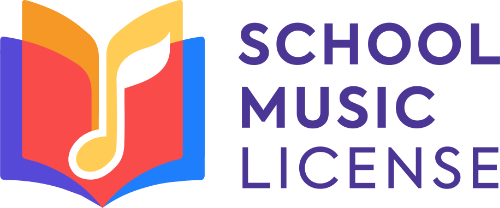Welcome to the School Music License copyright glossary—a compass for the intricate world of intellectual property and licensing. Whether you are an educator wanting to better utilize your license or simply seeking clarity on copyright terms, this glossary is your trusty guide. From “fair use” to “public domain,” and “licensing” to “infringement,” we have curated a collection of essential terms to empower you with knowledge so you can do more with the music you love!
*Terms are in alphabetical order.
Adaptation: Often a reworking of a traditional or public domain hymn or folk melody. The “new” (adapted) version may be under copyright if the adapter has made significant changes. Look at the printed version you have to determine if there is a copyright claim on the adaptation.
Administrator of Copyright: The entity (often a company) that administers the copyrighted work on behalf of the copyright holder. For example, if I am the copyright holder of a song, I may enter into an agreement with a publisher to have them administer that copyright on my behalf.
Album: The collection of tracks released by an individual or a label.
Archive: Saving a video or audio recording for future viewing or use.
Arrangement: An arrangement is a derivative work of an original composition.
Artist: The performer of the specific track, or the artist commonly associated with popularizing the track.
Note that sometimes the Artist and Composer are not the same person or group. Sometimes the Artist is the one who popularizes a song, but they are not the original Composer who created the song. An example of this is “I Will Always Love You.” While this song was widely popularized by Whitney Houston, the original Composer is actually Dolly Parton.
Composer: The person responsible for the creation of an original piece of music.
Copyright: A form of intellectual property law designed to protect any type of artistic medium, including songs, poems, drama, literature, or even computer software. Whatever the medium, it must be in a fixed form (meaning you cannot copyright an idea).
Copyright Holder: The person or entity that owns the copyright on a creative work (for example, a specific text, tune, arrangement, etc.). The copyright holder is the most important piece of information in determining whether or not a work is covered under School Music License.
Distributor: The digital distribution channel that delivers musical products (such as tracks and albums) to streaming services. This term can also refer to the company that distributes the works.
Fair Use: A doctrine of copyright law that permits the use of copyrighted material under specific circumstances such as criticism, news reporting, teaching, or research. These are not always guaranteed to qualify, as Fair Use is determined on a case-by-case basis.
Infringement: The action of breaking the terms of a law or agreement. Many commit copyright infringement without even realizing it. Part of our mission at School Music License is to educate our License Holders so they are fully equipped to navigate copyright pitfalls.
ISRC: The International Standard Recording Code, a unique and permanent identifier for a specific recording, independent of the format on which it appears. Only one ISRC can be issued to a track and an ISRC can never represent more than one unique recording. License Holders should note that the ISRC is a nationally recognized number that is different from the number that our colleagues at Music Reports use to identify tracks within our respective systems.
Label: The producer of the commercial recording of a song or album. Or, the company that owns or manages a recording of a song or album.
License: The reason you are here! The purchase of our license grants you the legal permissions to use the approved songs from our Member Publishers’ catalogs and enables you to easily report your usage for royalty distributions.
Lyricist: The person or persons attributed with writing the lyrics for a piece of music.
Lyrics: The text of a song or piece of music.
Master: The official original sound recording of a musical composition.
Member Publisher: The term that School Music License uses to denote those entities that have agreed to partner with us. Through our agreements with them, we are able to license the titles they have included in our database for the specific usage types they elect. Our Member Publishers might be the copyright holders themselves, or they may be a larger publishing company that administers (or owns outright) the copyrights for a variety of composers, authors, arrangers, or other artists.
Music Reports, Inc.: The company that School Music License partners with to help provide royalties to artists and publishers. Music Reports provides the data that customers see on the School Music License website, and we work closely together to ensure accuracy.
Permissions: The legal right granted by copyright holders to use their material.
Public Domain: Creative property that is not currently under copyright. The public “owns” these works and no permissions are necessary to utilize them. In most cases, music and text end up in the public domain because their copyright has expired, the copyright holder has decided not to renew the copyright, or the composer / author has intentionally placed the music or text in the public domain rather than copyrighting it. Works published after 1977 typically enter the public domain 70 years after the death of the author or composer, though renewing them is certainly possible.
Publisher / Publishing House: The company that publishes and administers the rights to a song.
Reporting: The process of recording usage of approved music on the School Music License website. This is how License Holders take an active role in making sure Artists and Publishers are getting fair compensation for their work.
Reprint: Reproducing the lyrics of an approved song in a program, on a website, or on a projection screen.
Royalties: A payment made to an Artist or a Publisher for the use of their music.
Sole Selling Agent: The only person, entity, or company that is allowed to sell the published and / or printed song, resource, collection, or musical score. This may or may not be the same entity as the publisher or copyright holder.
Song ID / SKU: The unique number generated by Music Reports used to identify tracks. This number is listed in gray to the right of the title on our search results page. Music Reports provides the data that customers see on the School Music License website, and we work closely together to ensure accuracy.
Stream: Any video or audio content being shared online concurrently with a live performance. Content may be displayed on any internet platform, including YouTube, Facebook, Instagram, TikTok, and Snapchat. You may also share the stream from those entities back onto your school’s website with the appropriate licensing, or link to the stream on social media. Note that embedding the video directly onto your school’s website without routing through a social media platform is not currently covered by School Music License, as that requires additional licensing clearances.
Track: The term used by Music Reports to describe a song or an audio recording.
______________________________________
We know there is a lot of terminology in the music industry, especially when it comes to copyright. If you are ever unsure about any of these (or other) terms, or have any questions or concerns, please reach out to our team at info@schoolmusiclicense.com for assistance. We are always happy to help!
______________________________________
Photo used with permission from Canva.com
Special thanks to Katie M. Deaver, Ph.D. and Brenna C. Horn-Cronin for their contributions to this article.

